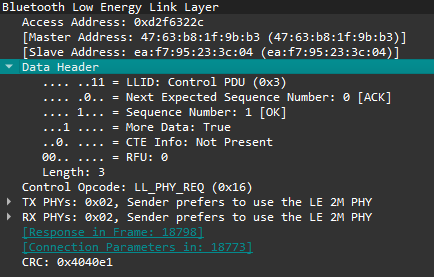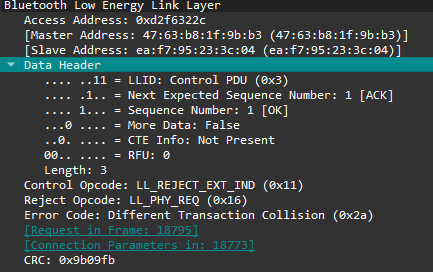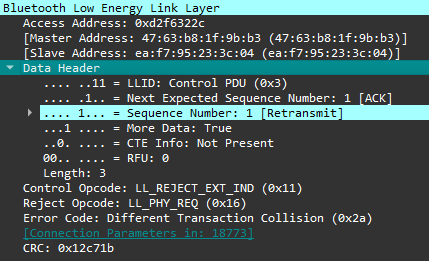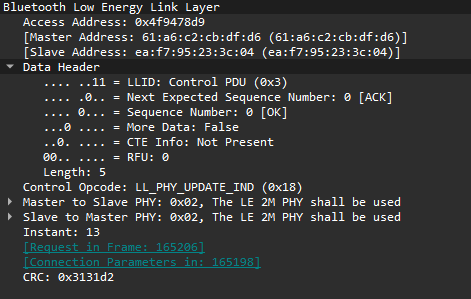I am working through BTLE Fundamentals, Lesson 6, Exercise 2, and running the code from blefund_less3_exer2 per the instructions and it all looks good on the app COM log:
*** Booting nRF Connect SDK v3.5.99-ncs1-1 ***
[00:00:00.000,274] <inf> Lesson3_Exercise2: Starting Lesson 3 - Exercise 2
[00:00:00.000,671] <inf> bt_sdc_hci_driver: SoftDevice Controller build revision:
36 f0 e5 0e 87 68 48 fb 02 fd 9f 82 cc 32 e5 7b |6....hH. .....2.{
91 b1 5c ed |..\.
[00:00:00.002,593] <inf> bt_hci_core: HW Platform: Nordic Semiconductor (0x0002)
[00:00:00.002,624] <inf> bt_hci_core: HW Variant: nRF52x (0x0002)
[00:00:00.002,655] <inf> bt_hci_core: Firmware: Standard Bluetooth controller (0x00) Version 54.58864 Build 1214809870
[00:00:00.003,540] <inf> bt_hci_core: Identity: EA:F7:95:23:3C:04 (random)
[00:00:00.003,570] <inf> bt_hci_core: HCI: version 5.4 (0x0d) revision 0x118f, manufacturer 0x0059
[00:00:00.003,601] <inf> bt_hci_core: LMP: version 5.4 (0x0d) subver 0x118f
[00:00:00.003,601] <inf> Lesson3_Exercise2: Bluetooth initialized
[00:00:00.004,486] <inf> Lesson3_Exercise2: Advertising successfully started
[00:00:15.846,984] <inf> Lesson3_Exercise2: Connected
[00:00:15.847,015] <inf> Lesson3_Exercise2: Connection parameters: interval 45.00 ms, latency 0 intervals, timeout 5000 ms
[00:00:15.915,740] <inf> Lesson3_Exercise2: MTU exchange successful
[00:00:15.915,771] <inf> Lesson3_Exercise2: New MTU: 244 bytes
[00:00:16.050,872] <inf> Lesson3_Exercise2: Data length updated. Length 251/27 bytes, time 2120/328 us
[00:00:16.275,756] <inf> Lesson3_Exercise2: PHY updated. New PHY: 1M
[00:00:16.501,007] <inf> Lesson3_Exercise2: Connection parameters updated: interval 7.50 ms, latency 0 intervals, timeout 5000 ms
[00:00:16.755,737] <inf> Lesson3_Exercise2: Connection parameters updated: interval 45.00 ms, latency 0 intervals, timeout 5000 ms
[00:00:21.270,660] <inf> Lesson3_Exercise2: Connection parameters updated: interval 1000.00 ms, latency 0 intervals, timeout 4000 ms
But in the sniffer output, I'm getting an error in response to the LL_PHY_REQ, and I have retried it many times:
|
Time |
Source | Protocol | Length | Flags | Channel Index | Delta time (start to start) | RSSI | Info |
| 1472.562202 | Slave_0xd2f6322c | LE LL | 29 | 0x01 | 31 | 326µs | -26 dBm | Control Opcode: LL_PHY_REQ |
 |
||||||||
| 1472.607106 | Slave_0xd2f6322c | ATT | 52 | 0x01 | 26 | 230µs | -23 dBm | Rcvd Read By Group Type Response, Attribute List Length: 1, Unknown |
| 1472.607544 | Master_0xd2f6322c | LE LL | 29 | 0x03 | 26 | 438µs | -45 dBm | Control Opcode: LL_REJECT_EXT_IND |
 |
||||||||
| 1472.651875 | Master_0xd2f6322c | LE LL | 29 | 0x03 | 30 | 44331µs | -42 dBm | Control Opcode: LL_REJECT_EXT_IND |
 |
I was trying to see if there was something I was missing, and ran into the definition of the 0x2a Different Transaction Collision error. It looks like you should wait for a response before sending out another request, and the exercise code doesn't do that. One comment I found mentioned that starting another request while one is in process is a spec violation. So I'm wondering if this is generally true for all requests, and for guidance on how best to accomplish this.
I modified the code as follows add a 1 sec sleep before the next request, and it eliminated the collision:
/* STEP 7.2 - Update the PHY mode */ update_phy(my_conn); // wait for a second - RLS k_sleep(K_MSEC(1000)); /* STEP 13.5 - Update the data length and MTU */ update_data_length(my_conn); update_mtu(my_conn);

So it looks like that may be something missing in the exercise, and I might want to send these async requests out awaiting the previous one to complete.
Can anyone comment on best practices for doing this?
I am not new to async programming or to C, but this is my first time around BTLE programming.

